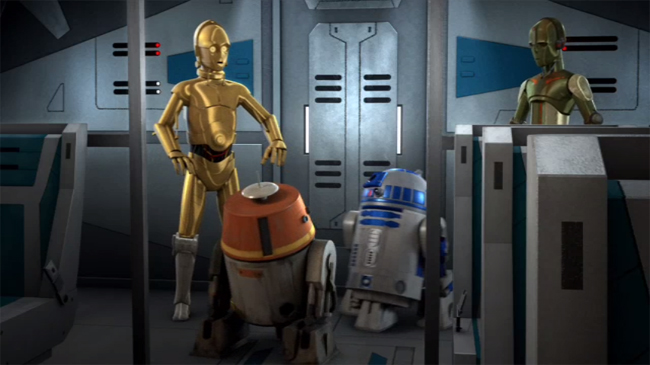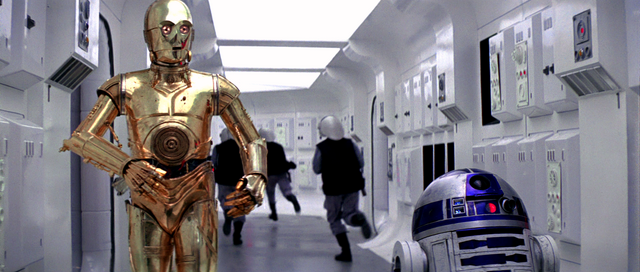
Ben: What is a droid? What constitutes intelligent life? Where does programming end and independent thought begin? Themes like these have been tackled in just about every major science-fiction franchise since the early part of the twentieth century. There are exceptions, of course, but one of the most surprising ones is our own Star Wars. Considering the massive presence of droids on-screen throughout all six films and The Clone Wars, it is somewhat interesting that, outside of a few novels and short stories, the issue of what rights droids have, whether they are considered life or merely property, has yet to be touched on.
In many ways, the events of Droids in Distress provide us with a snapshot of how the two major factions of the time treat the universe’s ubiquitous mechanical sidekicks. There is a stark contrast between the Imperial treatment of droids and the way the rebels interact with the droid member of their own crew, as well as this week’s special guest stars.
One the one hand, Imperial law states that droids are to spend transit time aboard commercial transports in the rear of the passenger compartment. Droids are apparently role-players, given a job and expected to do it without frills or complaint, and not expected or ordered to do anything exceeding their programmed and designed purpose. When the administrator protests at Threepio being sent to the rear of the ship, it is because she needs him to translate for her, not because he deserves to be up front instead, or is in any way special. He and Artoo, to her, are nothing more than utilities on legs (and wheels).
To counter that, when Chopper comes aboard the transport with the rest of the Ghost‘s crew, he is not there as a mechanic or computer interface, even though that is technically his role aboard their ship. Chopper is there as an essential part of their charade, a player in their plan to foil an Imperial plot. For the rebels, Chopper is a full-fledged member of the crew, and they do not think twice about asking him to do whatever task they need him to do for the mission to succeed, even if it is not something he is built or programmed to do. And Chopper, grumbling all the way, goes along with it.
This sort of contrast should not be a surprise. In many ways, this is a reflection of the philosophies both groups have about beings in general, not just droids. The Empire values utility, efficiency and hard work without recognition. Their stormtroopers, for instance, are nameless, faceless soldiers treated as an expendable resource, with numbers instead of names. Even officers and officials, whose names are known and faces are seen, are encouraged to strive more for the success, security and glory of the Empire than their own personal ambitions.
The rebels, in contrast, seek the better of others and preach the value of the individual. They are organized, but also individualized, each with their own role, but eager to help serve wherever they are needed. Improvisation and personalization are encouraged, as the spray-paint covering Sabine’s bunkroom attests. Every member of the crew is valued, everyone has a vote when decisions are made, and no one is left behind, not even the Lothal street-rat who had joined them through happenstance.
While the Ghost’s crew does debate selling the stowaway Artoo and Threepio in lieu of another payment, they ultimately deign to reunite the droids with their owner. When the pair end up back in Bail Organa’s company, he does not treat the droids as mere property, either. To him, they are confidants, information-gatherers, agents meant to foil one small part of the Empire’s designs. In many ways, they are the perfect spies, because it takes quite a lot for the Empire to notice a droid.
The line between programming and personality is blurry, especially in the somewhat eccentric Artoo, Threepio and Chopper, but seeing how the two sides view and treat the trio throughout the story is interesting. While the deeper issues of droid rights and the technical definition of sentience are not touched on, nor likely to be mentioned in a show meant for a young audience, Droids in Distress does give the audience a window into how droids fare in the galaxy under the Empire, and how it might behoove some of its denizens to treat them, for good or ill.

Jay: Now wait just a moment — I think the sentience vs. tools debate is certainly very interesting (and note well that dubbing it “sentience vs. slaves” presupposes sympathy with the sentience point of view), but let’s not pretend that the Rebellion is full of empathy for droids. Far from it, in fact. Let’s just look at the actual rebels for a moment: that is, the protagonists of the original Star Wars film who fought on the side of the Rebel Alliance.
- Rebel techs suggested that Artoo get swapped out in ANH, because he’s “beat up.” The droid is clearly a tool at this point, not a comrade-in-arms.
- Han and Leia shut Threepio down whenever he gets annoying, which is pretty despicable if you’re thinking of droids as sentient beings. Think about the implications of that for a moment. Han and Leia are either terrible, terrible human beings or they simply see the droids as tools.
- In fact, Luke is the only one among the main heroes of the film to treat the droids with empathy. He talks to them as if they were people, and as early as ANH, wants them to address him simply by his name. He treats them so well that Threepio — pessimistic, dour Threepio — cannot believe for a moment that Luke would ever give them away to Jabba the Hutt.
We don’t even need to discuss the Prequels, where everyone up to and including the vaunted General Kenobi treats droids as nonpersons (again, a person named Skywalker is the only exception) or the old Expanded Universe, which suggested that the Rebels participated in the standard practice of wiping droid memories every so often precisely to avoid them developing a personality. Once again, if we’re thinking of droids as sentient beings, the concept quickly turns abhorrent. The Rebels clearly aren’t thinking of them in those terms.
So while my colleague brings up the inhumanity of stormtroopers, I think he’s stretching a little with the droids. In this case, it’s the Ghost crew, the rebel Specters, who are out of step with mainstream thought. They treat droids with a humanity that the rest of the galaxy, including the future Rebel Alliance, doesn’t share. Indeed, his point might have been better taken were he to point out that stormtroopers were shocking because their faceless, nameless nature reminded him of droids: they are identified only by number, just like a droid.
The Empire may be accused of many things, but treating droids like droids is not one of them. That’s the case even if we agree with the Skywalkers that droids ought to be treated with respect and humanity, because that’s a very unusual viewpoint indeed.

This is a great discussion of a topic that I’ve often thought about, but not yet taken the time to think through.
As you guys pointed out, different beings have different relationships with and perspectives on droids. We saw throughout all the movies that pilots certainly have a generally positive relationship with astromechs, almost to the degree of camaraderie. Certainly Luke takes to R2 strongly in the original trilogy while the prequel trilogy provides several examples of this including the commendation of R2 for repairing the Queen’s ship in Episode 1 when they escape from Naboo to Obi-Wan’s partnership with R4. Certainly these droids were ‘tools’, but they were respected and acknowledged for their capabilities.
In many ways I see droids as a representation for the lower class. I wonder if this was Lucas’ intent. To many beings in the Star Wars universe droids are servants, butlers, and physical laborers. Even consider that droids may even be perceived as beasts of burden. In our own history, war horses were rarely injured intentionally, even when ridden by the enemy, as they became a spoil to the victor. This to me is represented in the opening scene of A New Hope when R2 and 3P0 cross the hallway on the Tantive IV in the midst of blaster fire from both sides. Was it luck? Of course not… neither side not only had any interest in hitting the droids, they preferred not to.
From a practical perspective, droids are, of course, non sentient. My truck, laptop, and cell phone perform a great deal of activities for me. While I hold value in the objects they are, I don’t value them as I would a creature. That said, none of them interact with me as droids do in the Star Wars universe (Siri aside – although that is a prompted interaction). Our favorite droids in Star Wars have personalities which make them not only likable but also humanize them – even the beeps of R2.